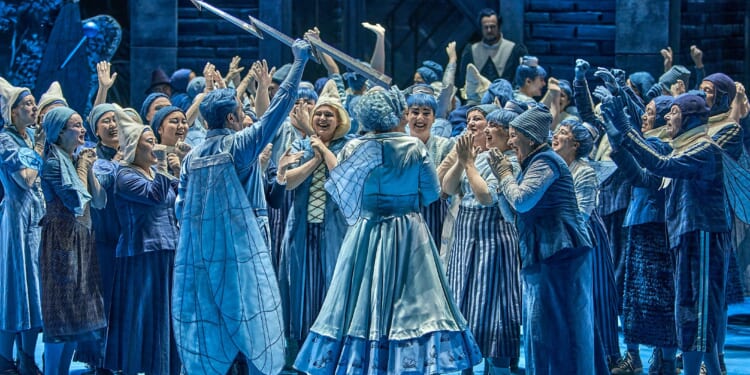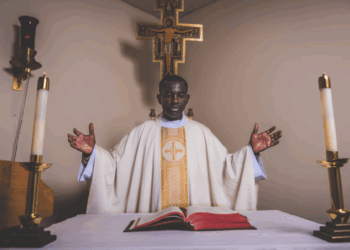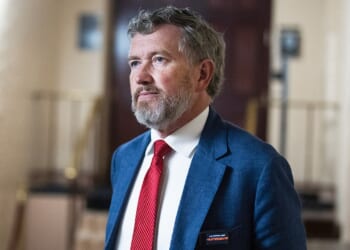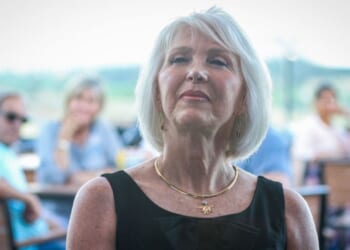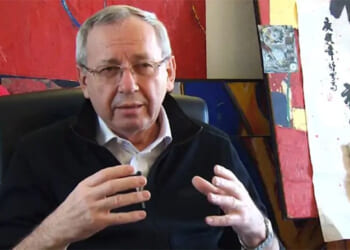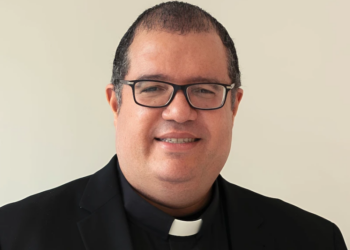In 2018, Yuval Sharon, the artistic director of Detroit Opera (formerly Michigan Opera Theatre), became the first American to stage a production at the Bayreuth Festival, having received his commission shortly before Donald Trump’s first election to the U.S. presidency. “For the many of us who saw the 2016 election as a catastrophe,” Sharon writes in the program notes for his production of Richard Wagner’s Lohengrin, revived this summer at Bayreuth, “we had one rallying cry as a symbol of hope: the Future is Female.” So, in Sharon’s conception, are the present and legendary past.
Fortunately for the audience, what Sharon imagines to be a “subversive” interpretation of Wagner’s “Romantic opera” remains almost totally opaque unless one takes the trouble to read his program notes. Obviously angry and bitter about American politics, he has attempted to reimagine Lohengrin as a tale of women’s liberation. Its male title character is no savior, but just another patriarchal figure who merely transfers the distressed Elsa, a princess of Brabant falsely accused of fratricide, from one oppressive situation to another. In Sharon’s reading, Lohengrin and Elsa’s marriage keeps her downtrodden, since it can last only as long as she refrains from asking her husband’s name or origin. In one of the very few scenes that plausibly supports Sharon’s concept, Lohengrin spars with Elsa over her ability to contain her curiosity while he binds her to a pole.
Sharon does not see Ortrud, the pagan princess who engineered Elsa’s persecution, as a malign manipulator seeking power for herself via her weak husband, Elsa’s accuser, Friedrich von Telramund. Rather he imagines her to be a “positive influence,” a “freedom fighter” who marshals her identity as an “indigenous person” to rebel against social hypocrisy and enlighten Elsa about the supposed struggle that unites them. The celebrated Swedish singer Nina Stemme, however, who sang the role in 2023 at the Vienna State Opera, said in an interview about the character: “The music doesn’t let you get too positive in your portrayal of her. Wagner’s very clear in his composition that Ortrud is a destructive quantity.”
Perhaps the most important measure of artistic success is the ability to communicate meaning naturally. By this standard, Sharon’s production is a failure. To the casual viewer, it looks like a fairly conventional retelling of the Lohengrin story, with sets that suggest the fanciful idiom of 1940s science fiction. The action unfolds around an old-fashioned power station, with garish colors and fixtures of unknown purpose. When Lohengrin fights Telramund in a challenge to prove Elsa’s innocence, the opponents fly through the air on winged devices that some early enemy of Superman might have used. In their suggestion of rudimentary electrical-power generation, the sets could easily lead one to the view that Sharon’s production comments more on the pitfalls of technology than the shortcomings of men.
For all his ardor, Sharon never quite finds a way to overcome the music, which in Wagner guilelessly narrates the action and comments on the plot, or the logic of the story, in which a disgruntled harpy plants insidious and destructive suspicions in the mind of an innocent. Having viewed the production in its second outing in 2019, I was rather surprised not to see alterations, which Bayreuth directors sometimes make for revivals.
Thankfully, the cast of experienced Wagnerians seemed uninterested in Sharon’s message and played their parts traditionally. The Polish tenor Piotr Beczała has grown more and more convincing in the title part over the years—it may even have become his signature role. Bright, airy notes resounded in the upper register, with sensitive pianos descending upon Lohengrin’s more soulful phrases. In tone and gesture, he recalled Ben Heppner’s best singing in the role and, as was the case with his performance in Munich the previous week, seemed far more the supernatural knight than the oppressive tyrant.
Elza van den Heever’s heavy line overwhelmed the opera’s Elsa, which needs a softer and more lyrical touch. One missed the creamy middle register and lithe notes of Annette Dasch, the star German soprano in previous productions. The Icelandic baritone Olafur Sigurdarson was a gruff Telramund but melted to the wiles of the Finnish mezzo-soprano Miina-Liisa Värelä, whose robust chest voice seemed to delight in defying the notion that the malevolent Ortrud is a force for good in the world. Värelä’s countryman Mika Kares commanded respect in the bass role of King Henry the Fowler, who holds a special place in German nationalist history as the first truly German ruler.
The performance’s greatest saving grace this year was the celebrated conductor Christian Thielemann’s return to the podium. He led a precise and insightful performance. Sharon, meanwhile, has been commissioned to stage Tristan und Isolde and the Ring of the Nibelung at the Metropolitan Opera between next season and the end of the decade. It will be up to New York audiences to decide whether he truly knows his Wagner.

